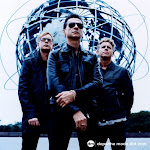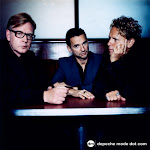
Aqui fica uma magnifica entrevista a Mr. Fletcher sobre a sua dj tour,e claro sobre os nossos DM...
By Adam Zacharias
With Depeche Mode on a break after another bumper world tour, bassist/keyboardist Andy Fletcher is enjoying his time off – by touring the world as a DJ. The mild-mannered Englishman shares his thoughts on the group’s phenomenal success and their chequered personal lives.
Look at today’s pop charts and you’re bound to see an assortment of dancefloor pounders, wistful ballads, rock anthems and catchy fluff aimed at teenage girls.
In fact, look at most pop charts in the last half-century and you’d find these four divisions have dominated in one way or another.
Which makes Depeche Mode that much more of an anomaly. Their pioneering brand of dark electronica surfaced in the early 1980s, with early singles Just Can’t Get Enough and See You capturing the public’s attention.
And yet while New Wave receded and synth-pop imploded, the Essex lads stood firm as a band who eschewed straightforward pop yet remained consistently popular.
Today the band are heralded as integral precursors to all manner of modern genres, and boast a fan base of loyal oldies and converted ‘noobs’ (proven with 2009 album Sounds of the Universe, which hit the top five in the UK and the US).
With Depeche Mode on a year-long break, bassist/keyboardist Andy Fletcher is continuing his second life as a DJ by embarking on a mini-world tour.
Playing Trilogy nightclub in Dubai tomorrow evening, Andy chatted to City Times about keeping upbeat.
What are the chief differences between touring alone and with Depeche Mode?
It’s a big difference. With Depeche it’s a gang – we’re kings of the city that night, VIP anywhere we want to go, and onstage we’ve got our mates with us. Plus if you’re DJing on your own and make a mistake, it’s down to you.
So it’s preferable to touring as a DJ?
No, I think the good thing about DJing is that it’s usually me and another guy, and everything is small. You go to dinner with the promoters, you tend to meet more people. It’s just a totally different experience.
Among the band’s many accomplishments is selling 100 million singles and albums. Does the sheer size of Depeche Mode still stun you ever?
You have to remember that we’re one of the old-style bands that actually grew from nothing. We’ve played youth clubs, pubs, small theatres, big theatres, arenas, stadiums…we come from a more traditional background, which a lot of artists these days don’t have. They’re superstars overnight.
How long did it take you to become superstars?
Well, first of all we were big in the UK, then we started to do well in Scandinavia, then Germany, then France, then the big surprise was when we broke in America. We didn’t really feel our music was suited to the States at the time.
What do you think struck a chord with Stateside audiences?
I think they were fed-up with Foreigner and Journey and groups like that. It was when alternative radio started to break in America, and fortunately we were one of the first bands they played. From that came other major American acts like Pearl Jam and Nirvana.
Your music has a reputation for its seriousness. What do you think of that?
We like to think there’s a prevailing sense of humour. It’s slightly angst-ridden, but we do different styles.
And personally, do people tend to think you’re all gloomy by nature because of your music?
We’re not actually gloomy by nature – people who meet us face-to-face don’t think so. We take our music seriously, but we write songs about everyday life.
Looking back, how will you remember the 2009-10 ‘Tour of the Universe’ to accompany the group’s 12th album?
It started off disastrously – my dad died on the first date, and Dave (singer Dave Gahan) was diagnosed with cancer on the second date. But we got ourselves together and it turned out really well.
You were famous for your wild antics on tour in years gone by.
Our fame was accelerating at a very fast pace. America’s a tough country, but once you start breaking big there everything’s available to you. It just became too much. Dave was a heroin addict, I was in the midst of a big depression and Martin (guitarist/songwriter Martin Gore) was drinking a lot. But I feel that every person will go through a bad stage at one point in their life. I had to learn what my weaknesses were, handle them and move on. Now we’ve got families and it’s a different world for Depeche Mode.
With all the drama, are you surprised that your line-up has seen only two changes in more than 30 years?
We’re quite lucky in that we come from the same town, have the same friends and share the same sense of humour. We’ve also been lucky with the people we’ve met over the years, like Daniel Miller from Mute Records. We were able to progress at our own pace, and weren’t forced by a major label to over-commercialise what we were doing.
Many modern bands cite Depeche Mode as an influence, from The Pet Shop Boys to The Deftones.
We’re now at an incredible stage of our career where we seem to be loved by everyone. New artists always cite us – it’s really just been a wonderful career. You can hark back to those few years we were in trouble, but it’s been a dream come true.
What’s the secret behind the band’s ongoing popularity?
We’ve consistently written good songs, we’ve had a good record company…lots of reasons.
So everything’s tickety-boo today?
You sound like a bloody doctor! Yeah everything’s excellent. I’m off to have my breakfast.





.jpg)

2 comentários:
Entrevista à la Fletch...Pode não ser grande espingarda como músico, mas não é burro nenhum e sabe muito bem o que dizer...
Grande Fletcher!
Gostei muito desta entrevista..
Enviar um comentário